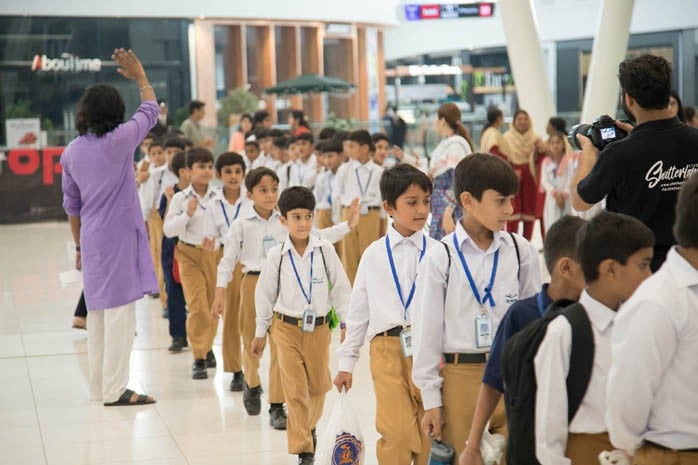
The 10th edition of Lahore International Children’s Film Festival proved to be a joyous experience for scores of primary-school attendees

In today’s age, where visual mediums are taking over more and more forms of information and entertainment, especially for children, the recently concluded Lahore International Children’s Film Festival 2018 offered thousands of school-age children a wondrous experience to see what their peers from around the world had produced. The colourful event was organised by The Little Art, a not-for-profit organisation.
This year, the organisation celebrated its 10th year of hosting the festival, and the response was expectedly huge, as children wearing uniforms of different schools poured into the Cinepax Cinemas at the Packages Mall on all six days of the festival.
The LICFF ’18 was inaugurated by Punjab Minister for School Education Dr Murad Raas, with notable guests including Asghar Nadeem Syed, Adeel Hashmi and Usman Pirzada. Hashmi explained that art is the best medium for children to learn through.
Ali Asghar, 12, a student of Beaconhouse, Lahore, said: "I have always been interested in filmmaking, and sometimes I shoot small clips from my phone. I’m inspired by the films these schoolchildren have made, and want to make one with my own friends."
Like all the other children that had thronged the venue, he was in high spirits.
This year, the festival also involved a filmmaking competition for Pakistani youth, titled ‘My Mother/My Father,’ a theme which brought forward original and sometimes emotional ideas from the young filmmakers. Talking to TNS on the sidelines of the event, Omer Ijaz Khan, Senior Manager Development for the Festival, said that the LICFF "aims to involve children from all strata of society and offer them the rare opportunity to watch and create films.
"We encourage children from all backgrounds and schools to participate. There is no concept of using only the best equipment. Children from schools with fewer resources can even make one entirely on their mobile phones," he added.
Khan also revealed that workshops were run for schools that had no resources. A Slice of Life, produced by Learning Alliance, Lahore, won the competition.
The LICFF ‘18 featured 72 films from 29 countries, with the children from various schools who attended the event also learning about the cultures and traditions in other nations. Over a thousand children are said to have attended the festival. "A great enthusiasm has been witnessed this year," Khan commented. "We believe that giving children a chance to express themselves through filmmaking opens up new avenues for them."
Umar Peerzada, one of the guests on the opening day, said that it was commendable that the event had been run consistently for a long period and that the children’s cinema was hugely important for the upcoming generation.
The festival is expected to tour smaller cities across Pakistan, having already been organised in Gilgit, Bhakkar, Faisalabad, Jamshoro and other places where children have fewer opportunities to explore non-traditional forms of entertainment and expression.
There were certainly plenty of opportunities at the event. The films themselves offered something for everyone to enjoy, no matter the age or areas of interest; from lighthearted animations like Treetop Family Sparrows Learn to Fly to more serious films highlighting important issues such as Are You Volleyball based on the refugee crisis.
Apart from the films, there were story-telling sessions, photo exhibitions depicting the culture of Pakistan, and stalls where artwork could be created, and opportunities for children to explore new mediums and new ideas. The expressions on the faces of children told the story better than anything else.
"This is so much fun! I love stories, especially in film but also through books," said Haniya, aged 8. Her teacher Ms. Parveen agreed with her, and said that there should be many more outlets of similar nature for children to "have fun and get away from their schoolbooks."
While some of the international entries showed a higher level of sophistication and, perhaps, experience by the young filmmakers, it is quite apparent that Pakistani children are learning more and more each year that the festival runs. They brought to the screen some unique ideas and ways of portraying them, often without any professional training.
There is every reason to believe that the storylines will continue to improve as children gain this rare access to films made by their peers from around the world. In the past, of course, before The Little Art made the efforts to introduce film to children, it had been almost impossible to witness what young filmmakers in other parts of the world were producing. Now, each year, dozens of films have been witnessed and through its 10 years, the festival has attracted tens of thousands of children. This is a rare feat in a country that badly needs to give importance to creative expression and the ability to think with an open mind amongst its children. The tradition of ‘rote learning’ which continues in the majority of our schools holds back children from the freedom to use their minds and develop original thought.
Most of the children who watched the films screened at the festival were enthralled by the images on the screen; the younger ones revelled in the general atmosphere of happiness that was evident everywhere during the event.